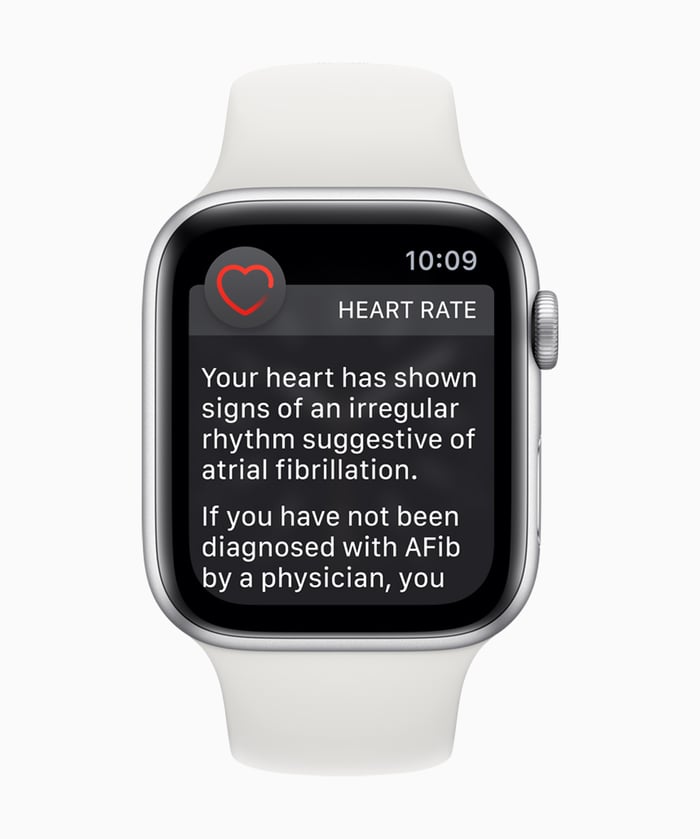When Apple (AAPL 1.27%) released the Apple Watch Series 3 late last year, the company telegraphed its growing interest in health with the groundbreaking abilities of the device's heart-rate monitor and optical sensor. The device's ability to take heart measurements during workouts, in recovery, and at rest was simple enough. The icing on the cake is its ability to detect a spike in heart rate that typically accompanies atrial fibrillation, also known as AFib. Many patients don't know they have the condition, since it rarely produces symptoms.
Apple took this a step further, partnering with Stanford University to launch the Apple Heart Study, an investigation to determine how accurately the Apple Watch could detect these irregular heartbeats, which can be a warning sign of an oncoming stroke. The company sent recruitment emails to Apple Watch users and made signing up for the study easy -- simply download an app and wear the Watch. No one could have foreseen the staggering response.

Image source: Apple.
Biggest. Ever.
A recent issue of the American Heart Journal illustrates the power of Apple's brand and the simplicity of its approach. Based on the Journal's reporting, the Apple Heart Study enrolled a massive 419,093 participants, making it the largest investigation of its kind ever fielded. To put this into perspective, a large-scale Swedish study also investigating arrhythmia screening fielded just 25,000 participants.
The sheer mass of the study was important to researchers, as bigger is generally better when it comes to investigations of this type -- the larger the sample size, the narrower the margin of error for the study. Stanford Medicine researchers say that the study is in the final stages of data collection. Results should be available early next year.
The fruits of Apple's labor
The U.S. Food and Drug Administration used data from the study as an important catalyst for Apple. The agency announced in September that it had cleared two mobile medical apps designed for use with the Apple Watch.
One app "analyzes pulse rate data to identify irregular heart rhythms suggestive of atrial fibrillation and notify the user," and will be available on all versions of the Apple Watch. The second app creates an electrocardiogram (ECG) to monitor the heart "to detect the presence of atrial fibrillation and regular heart rhythm," and will work with the Apple Watch Series 4.
It's important to note that neither of these apps is intended to replace a visit to the doctor, but merely to provide a notification that will act as a starting point for a discussion with a physician.
With the blessing of the FDA, the company activated the Watch's heart monitoring and notification features through the release of WatchOS version 5.1.2.

Image source: Apple.
A massive opportunity
Apple has made a number of moves that show its growing interest in the healthcare field. Apple was one of nine companies the FDA selected as part of a pilot program to pre-certify companies wanting to create software-based medical apps -- like its heart monitoring and ECG apps -- which recently led to the clearance of those apps.
Other features in the Apple Watch 4 attest to Apple's ambitions. The addition of a gyroscope and accelerometer gives the device the ability to detect when the wearer has slipped, tripped, or fallen. Reports from earlier this year also indicate that Apple is looking to develop a custom processor to collect and analyze data from its health, wellness, and fitness sensors.
As investors focus on slowing iPhone sales and look to other products and services to generate growth, Apple's growing interest in healthcare could provide a massive and lucrative opportunity.





